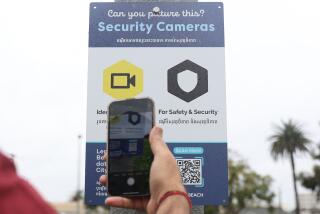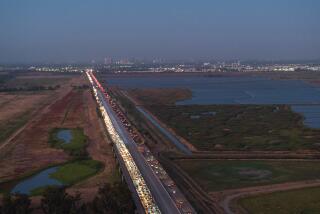Ubiquitous Cameras Are Raising Concerns
Technology advances so quickly that the law can’t keep up. For instance, federal restrictions limit how audio recordings can be made. It’s illegal to tape other people’s telephone conversations. But no such restrictions exist for videotape. As a result, automated cameras can tape pretty much anything, anywhere, anytime, as long as the microphone is turned off.
So jammed with electronic eyes is modern life that anybody walking the four blocks from a little coffee shop near Spruce and Nassau in Manhattan to meet somebody at the corner of Broadway and Fulton will walk past at least 10 video cameras along the way. To take the same trip without passing cameras would turn a four-block stroll into a 22-block marathon.
This information comes from a Web site, www.appliedautonomy .com, that culls a database of about 5,000 cameras around Manhattan. The site is an exercise by groups concerned that all these cameras are slowly and silently whittling away civil liberties.
The cameras monitor activity in front of bank machines, storefronts, apartment buildings and parks. Designed to thwart crime, they also incidentally capture everything else that happens in their field of vision. These cameras are installed to help catch criminals, and that’s usually what they’re used for. Police routinely check camera footage to place people at the scene of a crime, for example. In that sense they provide a good and useful service that benefits society.
But there aren’t any restrictions on how that footage can be used. In Europe, a videotape called “Caught in the Act,” consisting entirely of legal but embarrassing moments captured on such cameras, went on the market this year.
Guards who watch the monitors that display pictures from an elevator can make a copy of those tapes for their own amusement or distribute them to the entire world via the Internet. IRS agents and law enforcement officers have a clear set of laws that allow them to be prosecuted for making your confidential information public. The typical rent-a-cop has no such restrictions and, as the British tape shows, no compunction about making a little extra money at the cost of an average Joe’s dignity.”This situation has evolved without anybody really paying attention to it,” said Donna Lieberman, executive director of the New York Civil Liberties Union. “Like many intrusions on our civil liberties, surveillance has increased bit by bit. At some point we may find ourselves living in a society where our every move is documented on videotape, with half of us living our lives and the other half watching them on TV.”
U.S. policies have prevented most government attempts at broad surveillance. But no such restrictions exist for the private sector, and that’s why citizens have suddenly started living life as the featured subjects in America’s Creepiest Videos.
The NYCLU started collecting data on cameras in Manhattan back in 1998. Today, that publicly accessible database contains the specific location of about 5,000 cameras. Another group, the Institute for Applied Autonomy, recently took that data and created the Web page that plots a clear path.
It’s not perfect.
The database only tracks cameras that can easily be seen by outsiders. Those big bubbles on the corners of buildings, lenses poking out of automatic teller machines and tiny red lights flashing in a darkened corner are dead giveaways that there’s a camera. But the increasingly tiny and inexpensive devices now available guarantee that many more cameras are out there that haven’t been spotted and added to the database.
What does it matter if the average citizen is captured on them?
“People visiting an abortion clinic, or attending a political rally, or going to a house of worship, or reading a book in a park are all participating in what we think of as public events, but all those behaviors are offered privacy protection under the Constitution,” said privacy activist Robert Ellis Smith.
“Being videotaped surreptitiously and having that information stored and controlled by someone for their own reasons without any influence by you over how it’s used violates that expectation of privacy,” he said.
Privacy laws, such as the restrictions on audio taping, were drafted when cameras were huge and expensive, according to Smith, who publishes the monthly Privacy Journal. Few people ever expected that cameras would become tiny enough to hide in a button, and cheap enough that any good video game costs more than a cheap Web camera. So the same lack of oversight that lets you set up a nanny-cam lets other people tape you as well.
“Do people have a right to know when they’re on camera?” Lieberman asked. “Should anybody be allowed to engage in surveillance when there’s no basis to suspect criminal behavior? These are fundamental policy questions that the government needs to address.”
*
Dave Wilson is The Times’ personal technology columnist. He can be reached at dave.wilson @latimes.com.
More to Read
Sign up for Essential California
The most important California stories and recommendations in your inbox every morning.
You may occasionally receive promotional content from the Los Angeles Times.










